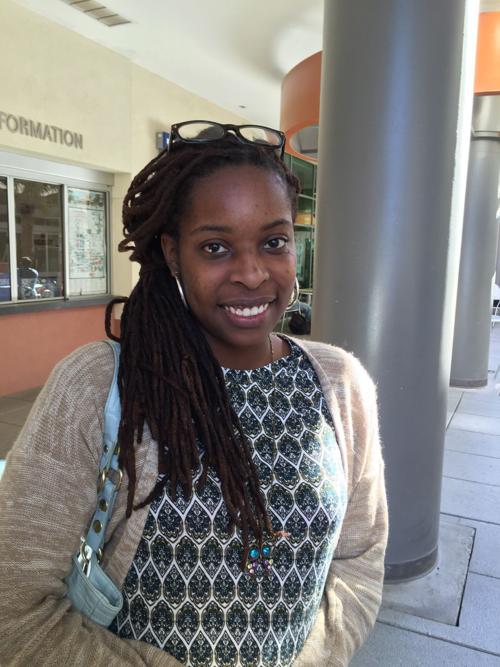Two days after she started classes at the University of Arizona, someone wrote “No nig**rs” on Nicollette Buckle’s mailbox.
“It made me feel like I didn’t belong here,” said Buckle, 24, a graduate student from New York City, who said she thought about leaving town and abandoning her quest for a master’s degree in geosciences.
“I felt scared and unsafe, like maybe someone would show up in the night and try to do something to me. I didn’t really know what to think because nothing like that had ever happened to me before.”
Hers was one of many accounts of discrimination that emerged when UA faculty senators recently went on a “listening tour” to better understand challenges facing female students, students of color and those who identify as gay, lesbian, bisexual or transgender.
The faculty outreach was in response to recent racial tensions on other U.S. campuses such as the University of Missouri, said Lynn Nadel, a psychology professor and chair of the UA faculty. “Given the national climate, we thought it would be good to check in with our students.”
In December, UA faculty senators met with students at six campus centers that provide support to women and minorities.
According to faculty notes from the meetings, the incidents students described included:
• Five cases of black students encountering the N-word. They included a group of black females on the UA Mall being referred to as “bitch nig**rs” by white males and “no nig**rs” scrawled on bathroom stalls in a residence hall.
• A professor who likened Mexicans coming over the U.S. border to an “invasive species” of desert rabbit.
• White students referring to Hispanic students as “illegals” and “anchor babies.”
• A professor who led the class in laughing at a foreign student after mocking her accent.
• A lecturer in the School of Government and Public Policy who told students “racial profiling is necessary to keep everyone safe.”
• A Chinese-American student whose professor assumed she was “low-English proficient” even after she told him she was born in Tucson. The professor “said he was a veteran of Vietnam and therefore knew a lot about China.”
• Faculty failing to realize, or failing to intervene, when gay, lesbian, bisexual or transgender students were being harassed by other students.
• Advisors who discourage students of color from applying to medical or graduate school. “Many of the students felt their advisors had low academic expectations of them.”
• Native American students “frustrated by well-intentioned but frequently ignorant professors making racial slights against them.” One student attending on a scholarship said a professor told her she “wasn’t like other Native Americans.”
• “There was a strong issue raised about Islamophobia on campus, and how it affects more than just the Muslim population (i.e., some were harassed even though they weren’t Muslim).”
• A professor who joked about pop star Chris Brown’s domestic violence record.
• Complaints that UA police officers are insensitive to sexual assault victims. “Their reaction is often one of slut-shaming — e.g what were you wearing.”
Some faculty members expressed shock over what they heard.
“I was absolutely taken back by what the students tonight were saying and felt my ignorance toward many issues being exposed,” chemistry professor John Pollard wrote after a listening session with black UA students.
In response to student concerns, some senators are calling for new measures such as mandatory cultural awareness training for students, the staff and professors.
UA Senior Vice President Melissa Vito said plans are in the works to improve the intercultural climate on campus, such as training staffers at UA residence halls to engage with freshmen on “how to break down stereotypes and question personal assumptions about others.”
“We have many people, students, faculty and staff who come here with varying degrees of maturity, insight and experience with people who are different from themselves,” Vito said.
Nadel, the faculty chair, said it was “disappointing” to hear of students facing problems at an institution of higher learning.
“We’re a university. We’re supposed to be smart people. It’s kind of hard to figure why anyone would do some of these things.”
In some cases, Nadel suspects people are unaware that their words or actions are offensive to those of other backgrounds.
“I think a lot of it is mindless. You tell a little joke, you don’t stop to think that it’s at someone’s expense.”
Nadel said he doesn’t believe discrimination is rampant at UA, “but even if it’s happening to 1 percent of the students on our campus, that’s too many. It’s not what we want.”
The students who spoke up said faculty members could prevent many problems by making it clear on the first day of class that discrimination is unacceptable.
Nadel agrees.
“There are practical steps faculty can take, like saying we will not tolerate students picking on each other or making fun of accents. I expect we will be having more discussions around those types of things.”
Vito, of UA administration, said the faculty listening tour is one of many efforts underway to better serve all types of students.
“We’re listening and talking with multiple groups on campus, getting their experiences out into the open and doing the work to improve people’s understanding,” she said.
“We can’t fix anything if we don’t acknowledge the problems and talk about them.”
Buckle, the master’s student whose mailbox was defaced, said faculty senators deserve credit for reaching out and said they seemed sincere in their desire to help.
“It’s a start,” she said. “At least they were willing to listen.”





